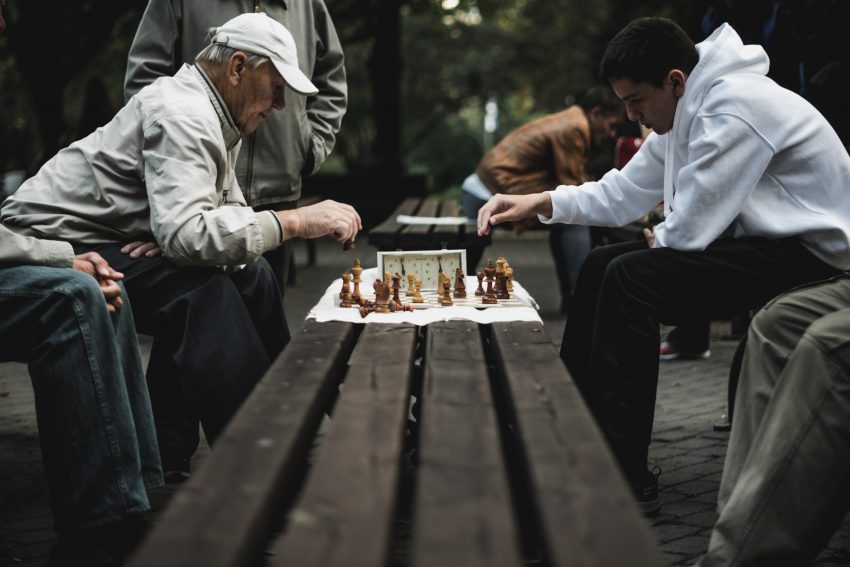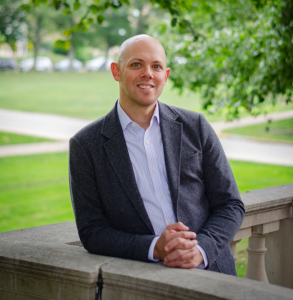Do neighbors matter? When we think about our social lives and wellbeing, our minds typically go first to the people closest to us: family, close friends, romantic partners. But what I’ve come to realize is the importance of “weak ties,” a term coined by Stanford sociologist Mark Granovetter. Weak ties are casual acquaintances, people we see infrequently, and “near strangers” with whom we share some familiarity. (Think: the people in our church, our weekly running club, the people who always ride the train at the same time as us, the barista at our corner coffee shop, other parents at our kids’ school, co-workers, etc.)
Most of us are familiar with the idea of an inner circle, usually made up of close friendships, familial relationships, and romantic partners. Granovetter suggests that equally vital to our social well-being is an “outer circle”: weak ties, loose connections, casual relationships. Whatever you want to call them, they’re important.
Weak Ties Broken
The pandemic all but removed us from outer circles, as everything became virtual and we retreated socially into our self-selected, inner circle “Covid crews.” Suddenly, weak ties ceased to exist.
“The psychological effects of losing all but our closest ties can be profound,” says Amanda Mull of The Atlantic. “Peripheral connections tether us to the world at large; without them, people sink into the compounding sameness of closed networks. Regular interaction with people outside our inner circle ‘just makes us feel more like part of a community, or part of something bigger,’ [social psychologist] Gillian Sandstrom [says] . . . People on the peripheries of our lives introduce us to new ideas, new information, new opportunities, and other new people. If variety is the spice of life, these relationships are the conduit for it.”
Mister Rogers’ Neighborhood
One of the most influential figures of my childhood was Mister Rogers. Today, 20 years after his death, he remains one of the most cherished citizens in Pittsburgh’s history. Incidentally, he was also a 1962 graduate of Pittsburgh Theological Seminary and an ordained Presbyterian minister.
There are a lot of things you can say about Mister Rogers’ Neighborhood and the theological lessons he subtly imparted on his popular children’s program. But one of the obvious elements of the show was hospitality. Mister Rogers opened us up to the reality of a beloved and diverse neighborhood, his neighborhood, which featured people of different professions, ages, genders, and abilities, all of whom were not only welcome, but celebrated for what made them special.
Mister Rogers visited people who made crayons or pretzels or lived in underground homes. His curious approach to the world and the people we share it with taught us that we can all learn something from each other, whether it’s a skill, experience, emotion, or feeling.
Exactly As You Are
The beauty of Mister Rogers’ Neighborhood was that everyone—from the mail carrier and school teacher to musicians, factory workers, and bakers; to children of different backgrounds, children with disabilities, and children who break dance to hop hop music—was valued “exactly as they are” and considered a vital part of the neighborhood. Rogers rooted this in his Christian faith. He once explained:
“Christianity to me is a matter of being accepted as we are. Jesus certainly wasn’t concerned about people’s stations in life or what they looked like or whether they were perfect in behavior or feeling. How often in the New Testament we read of Jesus’ empathy for those people who felt their own lives to be imperfect, and the marvelous surprise and joy when they sensed his great acceptance.” – Fred Rogers ’62
For Rogers, neighbors were people who cared for one another, listened with curiosity rather than judgment, and appreciated the other exactly as they are. Neighbors are, as the author of Hebrews says, the people who show hospitality to strangers and are shown hospitality by strangers. People who seek peace with others and act from a posture of grace and love rather than fear and judgment.
Good Neighbors Make Healthy Communities
In other words, neighbors are not always the people we know the best or most closely. Most of the time, neighbors are the outer circle of people who enrich our lives and foster individual and collective social wellbeing. Neighbors expand our horizons and cause us to think differently. They keep us connected and stave off social isolation. They help us recognize the humanity in each person and that a diverse community is a healthy community.
Which is why I don’t like the term “weak ties.” Because actually, these ties make us stronger. There’s nothing weak about having casual connections with people you only know a little bit. I prefer the term Mister Rogers used: neighbor. Neighbors are people we share our community with, and though we may not consider them close friends or confidants, we know them as the people who deliver our mail and teach our children. They worship with us on Sundays and go running with us on Thursdays, and ride the train with us into work or school most mornings.
These are our neighbors: our acquaintances, our casual connections, our “near strangers.” Everyone with whom we share this world, and our particular communities, is a neighbor. And this neighborly way of seeing the world is a strength not to be overlooked.
The Rev. Erik Hoeke is a communications strategist at Pittsburgh Theological Seminary and an ordained elder in The United Methodist Church.



